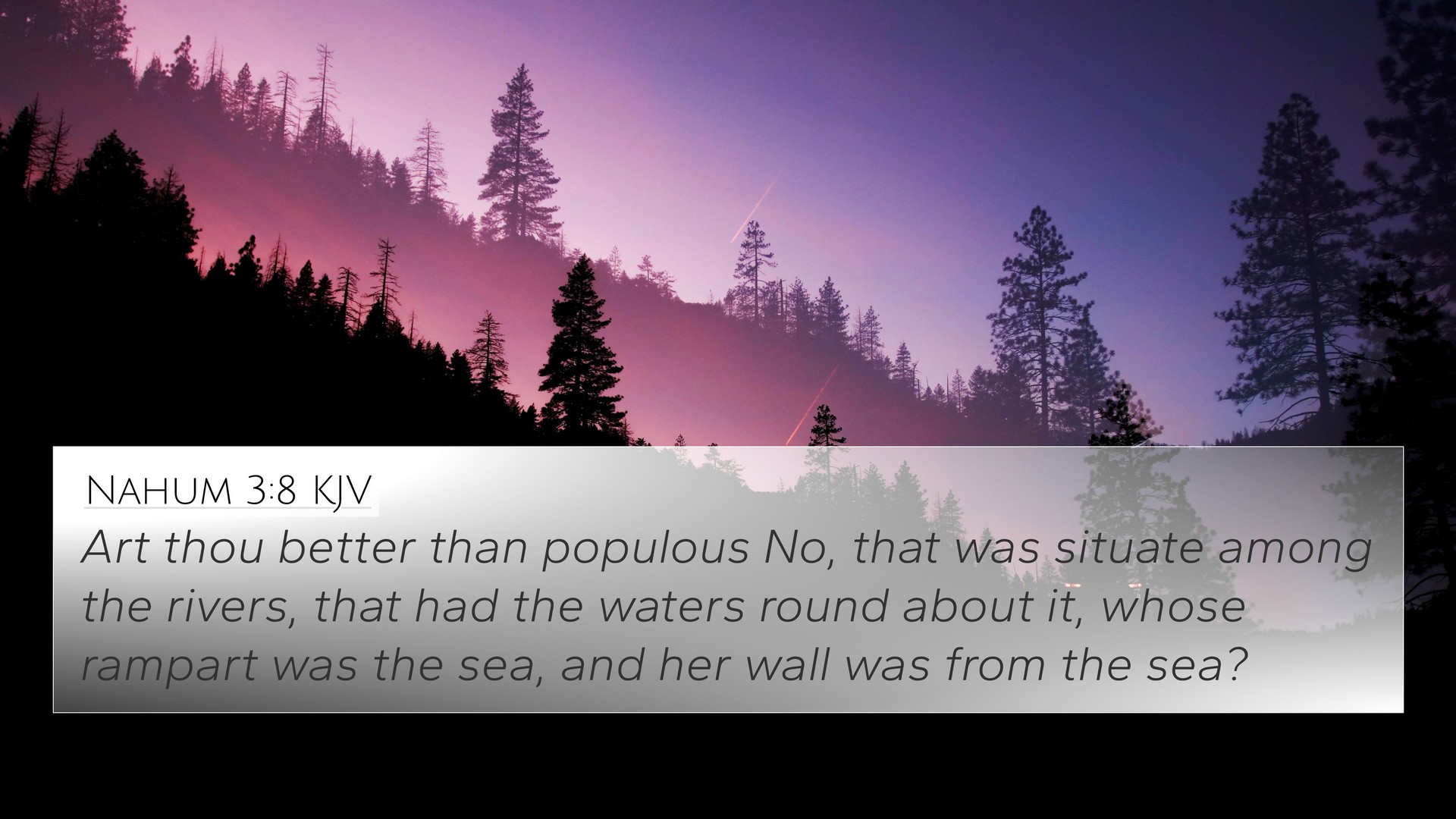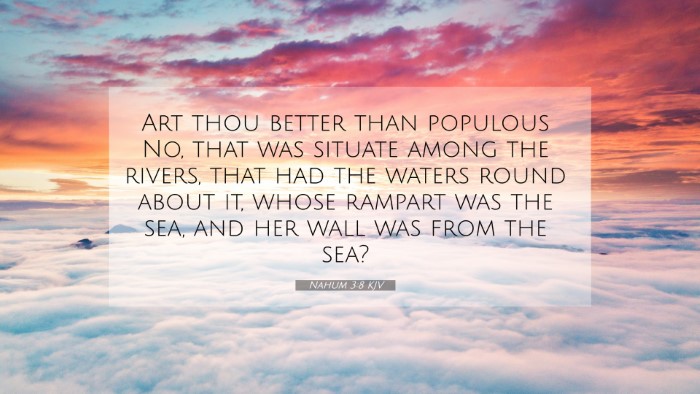Old Testament
Genesis Exodus Leviticus Numbers Deuteronomy Joshua Judges Ruth 1 Samuel 2 Samuel 1 Kings 2 Kings 1 Chronicles 2 Chronicles Ezra Nehemiah Esther Job Psalms Proverbs Ecclesiastes Song of Solomon Isaiah Jeremiah Lamentations Ezekiel Daniel Hosea Joel Amos Obadiah Jonah Micah Nahum Habakkuk Zephaniah Haggai Zechariah MalachiNahum 3:8 Similar Verses
Nahum 3:8 Cross References
Art thou better than populous No, that was situate among the rivers, that had the waters round about it, whose rampart was the sea, and her wall was from the sea?
Uncover the Rich Themes and Topics of This Bible Verse
Listed below are the Bible themes associated with Nahum 3:8. We invite you to explore each theme to gain deeper insights into the Scriptures.
Nahum 3:8 Cross Reference Verses
This section features a detailed cross-reference designed to enrich your understanding of the Scriptures. Below, you will find carefully selected verses that echo the themes and teachings related to Nahum 3:8 KJV. Click on any image to explore detailed analyses of related Bible verses and uncover deeper theological insights.
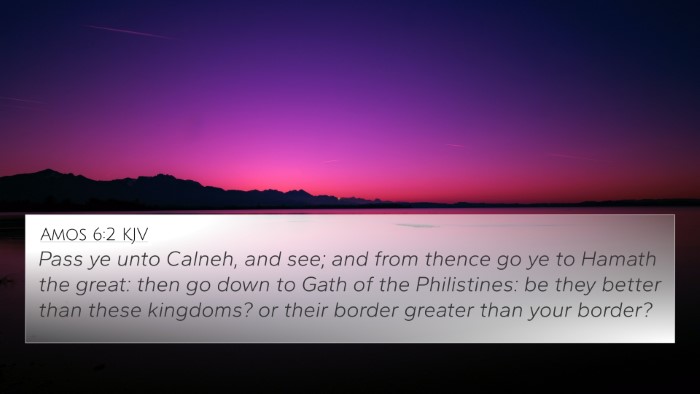
Amos 6:2 (KJV) »
Pass ye unto Calneh, and see; and from thence go ye to Hamath the great: then go down to Gath of the Philistines: be they better than these kingdoms? or their border greater than your border?
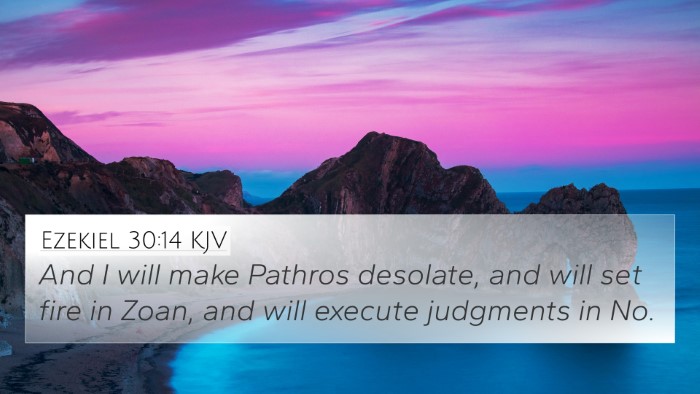
Ezekiel 30:14 (KJV) »
And I will make Pathros desolate, and will set fire in Zoan, and will execute judgments in No.

Isaiah 19:5 (KJV) »
And the waters shall fail from the sea, and the river shall be wasted and dried up.
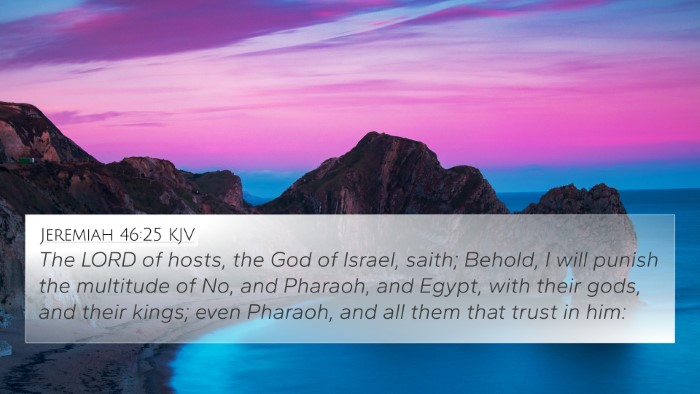
Jeremiah 46:25 (KJV) »
The LORD of hosts, the God of Israel, saith; Behold, I will punish the multitude of No, and Pharaoh, and Egypt, with their gods, and their kings; even Pharaoh, and all them that trust in him:
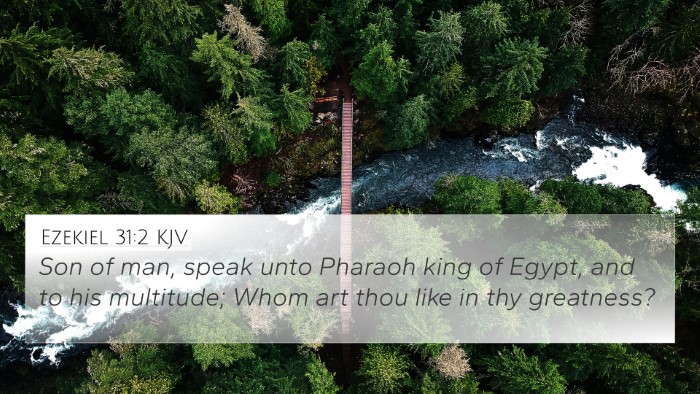
Ezekiel 31:2 (KJV) »
Son of man, speak unto Pharaoh king of Egypt, and to his multitude; Whom art thou like in thy greatness?
Nahum 3:8 Verse Analysis and Similar Verses
Nahum 3:8 - Summary and Interpretation
The verse Nahum 3:8 reads: "Are you better than Thebes, that sat by the river, that had the waters round about it, whose rampart was the sea, and her wall was from the sea?" This verse presents a rhetorical question comparing Nineveh, the capital of Assyria, to Thebes (or No-Amon), a notable city of Egypt, known for its strength and historical significance.
Contextual Background
Nahum prophesies the downfall of Nineveh, emphasizing its impending destruction. The city thought itself invincible due to its fortifications and position, much like Thebes, which was once a powerful city. The parallel drawn suggests that if Thebes could fall, so too could Nineveh.
Commentary Insights
-
Matthew Henry:
Henry emphasizes the pride of Nineveh and how its inhabitants trusted in their strengths, neglecting the power of God. He highlights the folly of thinking oneself better than another city that had previously been mighty and eventually fell.
-
Albert Barnes:
Barnes draws attention to the strategic location of Thebes with its surrounding waters intended for protection. He indicates that the rhetorical question serves as a caution for Nineveh, suggesting that security based on geographical advantage is ultimately in vain.
-
Adam Clarke:
Clarke provides insights on the historical context of both cities, noting Thebes' legendary strength and the eventual doom it faced. He draws a parallel to Nineveh's expectation of escape from divine judgment, reinforcing the message about the impermanence of earthly power.
Thematic Connections
This verse showcases the theme of divine justice and the temporality of human power. It serves as a reminder that no city, no matter how fortified, can escape the judgment of God, an idea echoed throughout Scripture.
Bible Verse Cross-References
- Ezekiel 30:14: "And I will make Pathros desolate, and will set a fire in Zoan, and will execute judgments in No."
- Jeremiah 46:25: "The Lord of hosts, the God of Israel, saith; Behold, I will punish the multitude of No."
- Isaiah 19:1: "The burden of Egypt. Behold, the Lord rideth upon a swift cloud, and shall come into Egypt."
- 2 Kings 19:36: "So Sennacherib king of Assyria departed, and went and returned, and dwelt at Nineveh."
- Zephaniah 2:13: "And he will stretch out his hand against the north, and destroy Assyria."
- Revelation 18:2: "And he cried mightily with a strong voice, saying, Babylon the great is fallen, is fallen."
- Proverbs 16:18: "Pride goeth before destruction, and a haughty spirit before a fall."
Applications and Lessons
From Nahum 3:8 and its surrounding context, several lessons may be drawn:
- Humility: Recognizing one's own limitations and the sovereignty of God is crucial.
- Consequences of Sin: The fate of cities can serve as a warning to nations today regarding moral decay and disobedience.
- Hope in Divine Justice: While judgment is severe, it reminds believers of the ultimate justice of God, providing hope that evil will not triumph.
Conclusion
Nahum 3:8 serves as a profound reminder of the transient nature of earthly power in the face of divine judgment. The comparisons drawn to Thebes highlight that no matter how fortified a city seems, it is always subject to the authority of God. By utilizing tools for Bible cross-referencing, believers can further explore the interconnectedness of these themes across scriptures, enriching their understanding of God’s word and His plan for humanity.
